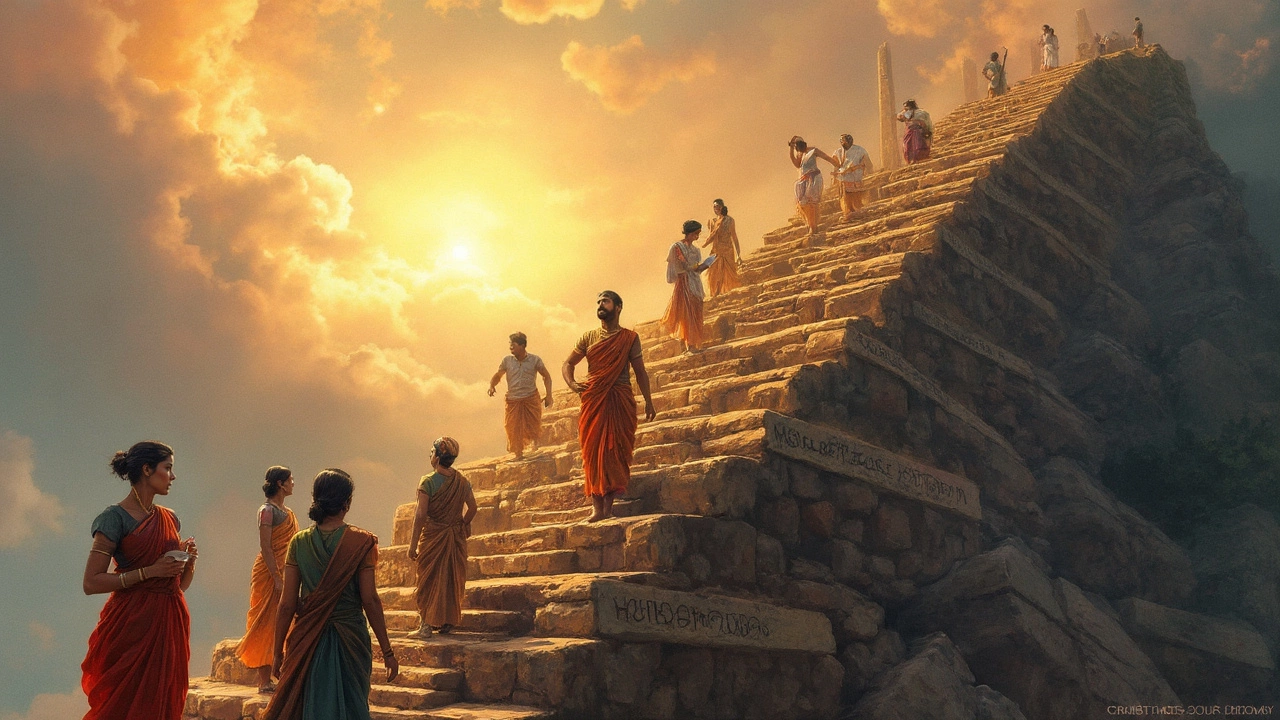No 1 Toughest Exam in the World: What Makes It Brutal?

Ever heard people claim an exam was so tough, it felt almost cruel? Around the world, some competitive exams are legendary for crushing even the most prepared candidates. Not just about memorizing facts or formulas—these tests push you to your mental and emotional limits. So you start to wonder: is there one exam that’s officially the world’s toughest?
Think about what ‘toughest’ actually means here. Is it the super low pass rate? The marathon-like length? The complexity of the questions, or just how much pain you’ve got to swallow in the process? Turns out, the answer is not as simple as just picking the hardest math worksheet.
If you’re someone who likes challenges (or just likes knowing what others are up against), knowing about these monster exams is almost a rite of passage. Plenty of smart folks, including friends and family, have tried them and walked away a bit humbler.
- Defining 'Toughest': What Are We Measuring?
- The No 1 Toughest Exam Revealed
- What Makes This Exam Nearly Impossible?
- Tips for Surviving Any Brutal Exam
Defining 'Toughest': What Are We Measuring?
Before we crown the toughest exam out there, let's break down what "tough" even means in the exam world. Most folks picture crazy-hard questions and nightmare study sessions. But every exam brings a different flavor of pain.
Some people say a test is tough because nobody seems to pass. Others point to the size of the syllabus—when you need to know everything from quantum physics to medieval poetry, it's a headache. Then there are tests that squeeze you for hours, only to toss in a curveball right when your brain is frying.
- Pass Rate: Exams with pass rates below 5% instantly earn the "killer" label. The lower the rate, the harder it hits.
- Exam Length: Some tests drag on for days. For example, the CFA Level 3 exam is six hours, split over a whole day. Others stretch over weeks.
- Subject Depth and Breadth: It's not just knowing a lot—it's knowing tiny details, mixed with problem solving. Like medical exams mixing biology, chemistry, ethics, and logic.
- Competition: More people fighting for a handful of seats means the bar just keeps rising. Think millions of students chasing a few hundred spots.
- Stress Factor: Some countries treat these exams as make-or-break for careers. Pressure from family and society turns the stress dial way up.
Here’s a peek at some factors that make exams tough around the globe:
| Exam Name | Pass Rate | Duration | No. of Applicants (per year) | Seats Available |
|---|---|---|---|---|
| UPSC Civil Services (India) | ~0.2% | 1 year (3 stages) | 1 million+ | ~900 |
| Gaokao (China) | Varies (very low for top colleges) | 2 days | 11 million+ | Varies |
| All Souls Prize Fellowship (UK) | <1% | 3 days | ~100 | 2 |
| CFA Level 3 | ~46% | 1 day (6 hours) | ~70,000 | N/A |
So when someone brags about surviving a brutal exam, it’s usually a mix of all these factors—not just a tough question or two. If you’re looking to eyeball which one’s the toughest, you have to look at the whole picture: pressure, material, competition, and sheer mental grind.
The No 1 Toughest Exam Revealed
When people start debating the world’s hardest tests, one name always fires up the conversation: the Gaokao in China. Ask anyone who’s gone through it, and you’ll hear stories about twelve-hour study days, endless practice questions, stressed-out parents, and even national TV coverage of the results. Gaokao stands for “National Higher Education Entrance Examination,” and it's not just a gatekeeper for college—it’s a life-changer. Over 12 million students fight through it every year.
The numbers are wild. Less than 0.1% of test-takers score high enough for China’s top universities like Tsinghua or Peking. The test itself runs about nine hours over two days, split between brutal math, science, language, and even morality questions. There are no second chances. You get one shot each year, and your whole future hangs on those results.
"The Gaokao doesn’t just test knowledge—it tests your endurance, your personality, your ability to survive pressure. Passing it is like finishing an ultra-marathon," said Professor Xiao Chen, Beijing Normal University, in a 2023 New York Times interview.
- The Gaokao is held once a year in early June.
- It covers everything from math to Chinese literature and foreign languages.
- Questions can get shockingly abstract or practical—like analyzing classic poems or solving giant logic puzzles under a tight clock.
| Year | No. of Test-Takers | Admission Rate to Top Schools |
|---|---|---|
| 2022 | 11.93 million | ~0.07% |
| 2023 | 12.1 million | ~0.09% |
Every country has its famous tough exam—the UPSC in India or the CFA for finance, for example. But none match the sheer scale, competition, or social impact of the Gaokao. Even folks who ace big tests elsewhere admit the Gaokao stands alone.
If you’re looking for the toughest exam on the planet, this is the one that keeps teens up at night and families living on edge for months. No other test feels quite so final, or so life-altering.

What Makes This Exam Nearly Impossible?
Let’s talk specifics. The title for the world’s toughest exam usually goes to China’s Gaokao or India’s UPSC Civil Services Exam, depending on who you ask. Both pile on insane pressure, but let’s break down why the Gaokao, especially, is often called a mind-bender even for genius-level students.
Every year, nearly 12 million students sit for the Gaokao, hoping for a shot at the country’s best universities. The test covers everything—math, Chinese, a foreign language, sometimes physics, chemistry, or politics—depending on your region and college choices. The numbers alone make your palms sweat: only about 0.1% of all test-takers get into China’s top two universities, Tsinghua and Peking.
But it’s not just what’s asked. The format is brutal. You sit for nine grueling hours over two or three days. Questions are not just factual; they test logic, analysis, creative thinking, and speed under tight time limits. A single bad answer can drop your overall score, killing dreams in a heartbeat.
The Gaokao isn’t forgiving. There’s no major “second chance.” Mess up that one weekend, and you might be facing another year of non-stop 14-hour study days for a retake. Families often invest huge sums in extra tutoring, and many students move to live alone, cutting themselves off from friends just to focus.
- Questions are unpredictable—sometimes math or essay questions are so hard they trend on social media for weeks.
- There’s insane competition: every single mark counts, and a tie-breaker could come down to a fraction of a point.
- The stakes couldn’t be higher. Your score not only decides your university, but sometimes your entire career path or social status.
Combine all this and you get an exam that isn’t just about knowledge—it’s about endurance, nerve, and being able to perform almost perfectly under crushing pressure. No matter how talented you are, this test can break you if you’re not ready for what’s coming.
Tips for Surviving Any Brutal Exam
Staring down the toughest exam in the world—or even just the hardest one in your life—can feel like trying to beat a video game on impossible mode. But there are ways to give yourself a real shot, no matter how scary the odds look.
First, know the enemy. Most tough exams like the UPSC in India, China’s Gaokao, or Japan’s National Center Test have a much lower pass rate for a reason. For example, only about 0.2% of those who attempt the UPSC crack it, and Gaokao eats up teens’ lives for years. That’s not to scare you—it’s to point out how much planning and habits matter when you’re facing these giants.
- Start Early, Go Steady: Marathon cramming never works for the really brutal exams. Experts say prepping 8-10 months beforehand, with regular study blocks, wins over burning out in the final weeks.
- Understand the Pattern: Top scorers spend hours breaking down the question patterns and weighing topics by past importance. Smart analysis beats mindless mugging every time.
- Practice With Mock Exams: Take at least 10-15 full-length mock exams. Data shows candidates who do this have up to a 60% better chance of clearing the real test.
- Review Smarter: Forget everything? Not if you keep revising. Many toppers use spaced repetition, a trick proven to help your brain hold onto information longer.
- Keep Your Cool: Ups and downs are normal. According to a 2022 survey, 78% of exam toppers admit to having breakdowns but say bouncing back and talking it out helped more than pushing through alone.
- Sleep is Not a Bonus: Science backs it: six or fewer hours of sleep per night drops exam scores on average by 10%. No, those extra hours of studying late don’t make up for it.
- Balance Counts: Take breaks, eat real food, and step outside. Top performers from the past five years across different exams swear that exercise and downtime help more than non-stop study marathons.
Here's a quick look at some real stats from top brutal exams:
| Exam | Average Prep Time | Pass Rate | Recommended Mock Exams |
|---|---|---|---|
| UPSC (India) | 10-12 months | ~0.2% | 10-15 |
| Gaokao (China) | 2-3 years (often) | Varies (top colleges: <0.5%) | 20+ |
| JEE Advanced (India) | 8-10 months | ~2% | 15-20 |
Battling these monster tests isn't about being a genius. It’s about good routines, real practice, a cool head, and asking for help when burnt out. Even if the odds are low, with the right moves, you give yourself the best fighting chance. Don’t try to do it all alone—it’s a team sport, even if the actual exam is a solo act.
Write a comment